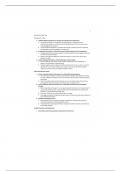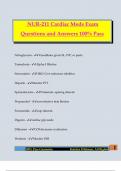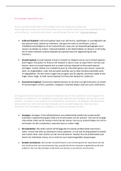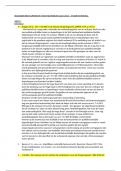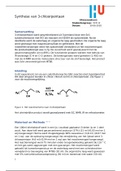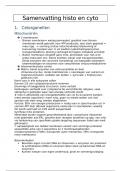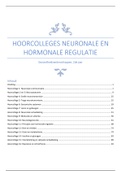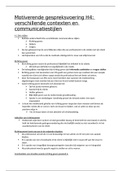Remediation Med/ Surg
Management of Care
1. Diabetes Mellitus Management: Teaching about Blood Glucose Monitoring
A. Thrombotic strokes occur secondary to the development of a blood clot on the
atherosclerotic plaque in a cerebral artery that gradually shuts off the artery and causes
ischemia distal to the occlusion.
B. The left cerebral hemisphere is responsible for language, mathematics skills, and analytic
thinking (right extremity hemiplegia or hemiparesis).
2. Postoperative Nursing Care: Priority Assessment Finding Following a Total Laryngectomy
A. Postoperative Clients who receive epidural or spinal anesthesia require ongoing assessment
of motor and sensory function.
B. Report a blood pressure difference of 25% from baseline, a drop of 15 to 20 mm Hg in
diastolic or systolic
3. Stroke: Discharge Planning for a Client Following an Ischemic Stroke
A. Expected findings: Some clients report transient manifestations (visual disturbances,
dizziness, slurred speech, a weak extremity)
B. Unilateral neglect syndrome (ignore the left side of the body: cannot see, feel or move the
affected side, so the client is unaware of its existence) Can occur with left-hemispheric
strokes but is more common with right-hemispheric strokes.
Safety and Infection Control
1. Cancer Treatment Options: Interventions for a Client Who Has Neutropenia
A. The risk of serious infection increases as the absolute neutrophil count (ANC) falls. An ANC
less than 1,000/mm3 indicates a weak immune system and the need to initiate neutropenic
precautions.
B. Wash the toothbrush daily in the dishwasher or rinse in a bleach solution. Discard liquid
beverages that have been sitting at room temperature for longer than 1 hr
2. Cancer Treatment Options: Nursing Care for a Client Who is Receiving Internal Radiation
Therapy
A. Route: Depending on the agent, it can be given topical (for skin lesions); Oral; parenteral; IV;
intra-arterial; intraventricular; intracavity, which includes abdominal cavity; intravascular
(bladder); or intrathecal (spinal cavity) route.
B. Oral meds, should not be crushed, split, broken, or chewed
C. Encourage consumption of high-protein, high-calorie, nutrient-dense foods and avoidance of
low or empty-calorie foods.
3. HIV/AIDS: Teaching Home Care
A. Encourage the client to maintain up-to-date immunizations, including yearly seasonal
influenza and pneumococcal polysaccharide vaccine.
B. Nucleoside reverse transcriptase inhibitors: Zidovudine interferes with the virus’s ability to
convert RNA into DNA
Healthy Promotion and Maintenance
1. Heart Failure and Pulmonary Edema: Instructions for Home Care
, 2
A. If self-administering Digoxin, be sure to: Count your pulse for 1 minute before taking the
medication. If the pulse rate is irregular or the pulse rate is outside of the limitations set by
the provider (usually less than 60/min or greater than 100/min), hold the dose and contact
the provider
B. Do not take digoxin at the same time as antacids, separate the 2 meds by at least 2 hours.
C. Have blood digoxin and potassium levels checked regularly
2. Hepatitis and Cirrhosis: Educating Staff About Hepatitis A
A. Hep A – Fecal-Oral, Indigestion of contaminated food or water, especially shellfish. Contact
with infected stool (incontinent individuals, anal sexual activity)
B. Clay-Colored stool
3. Immunizations: Recommended Vaccinations for Older Adult Clients
A. Flu Vaccine
B. Meningococcal Conjugate Polysaccharide MPSV4
C. Shingles/Zoster Vaccine
D. Pneumococcal Vaccination
4. Pulmonary Embolism: Risk Factors for Deep-Vein Thrombosis
A. Long-term immobility
B. Oral contraceptives use and estrogen therapy
C. Pregnancy
D. Tobacco use
E. Hypercoagulability (elevated platelet count)
F. Obesity
G. Surgery (especially orthopedic surgery of the lower extremities or pelvis)
H. Central venous catheters
I. Heart failure or chronic atrial fibrillation
J. Autoimmune hemolytic anemia (sickle cell)
Psychosocial Integrity
1. Preoperative Nursing Care: Priority Action for a Client Who Has Alcohol Intoxication
A. Consent cannot be given by individuals who are underage, intoxicated or incapacitated by
drugs or alcohol, or asleep or unconscious
B. Allergies to banana or kiwi can indicate the client is at risk for a reaction to latex
C. Allergy to eggs or soybean oil is a contradiction to the use of propofol for anesthesia
D. Allergies in shellfish can result in a reaction to povidone-iodine
E. If taking acetylsalicylic acid, stop taking it for 1 week before elective surgery to decrease the
risk of bleeding
F. The nurse is not to obtain consent for the provider in any circumstance
Basic Care and Comfort

